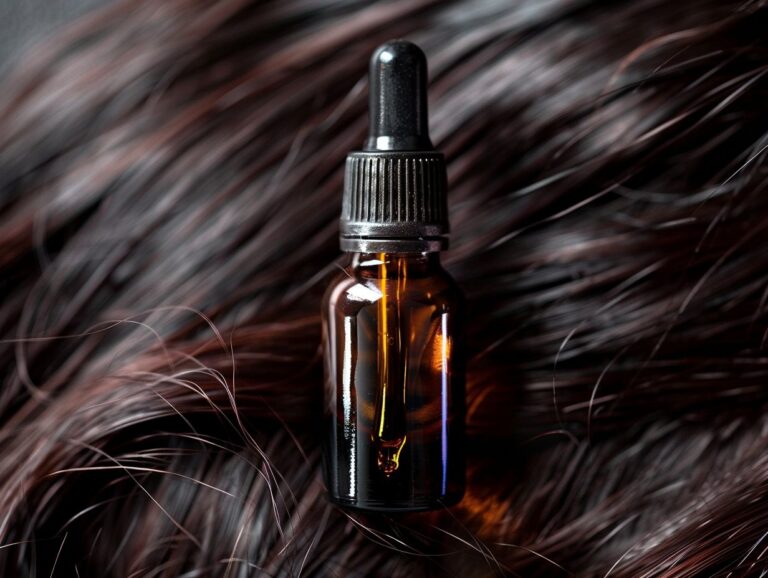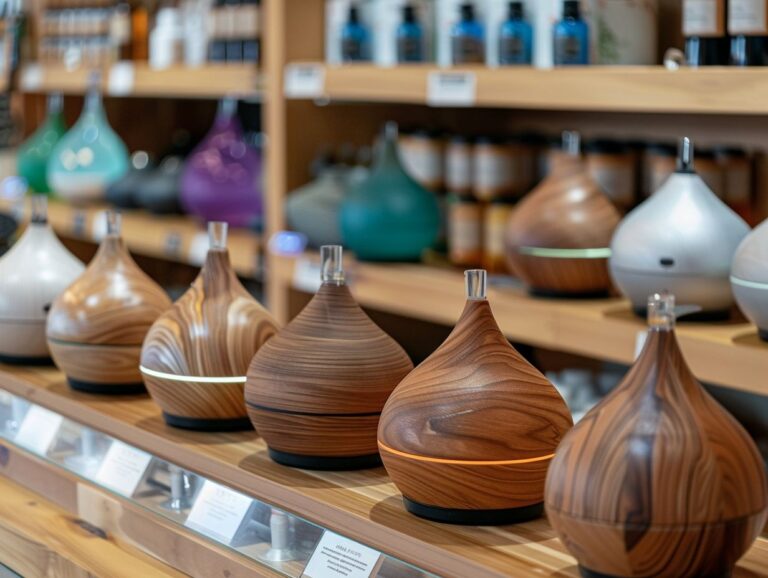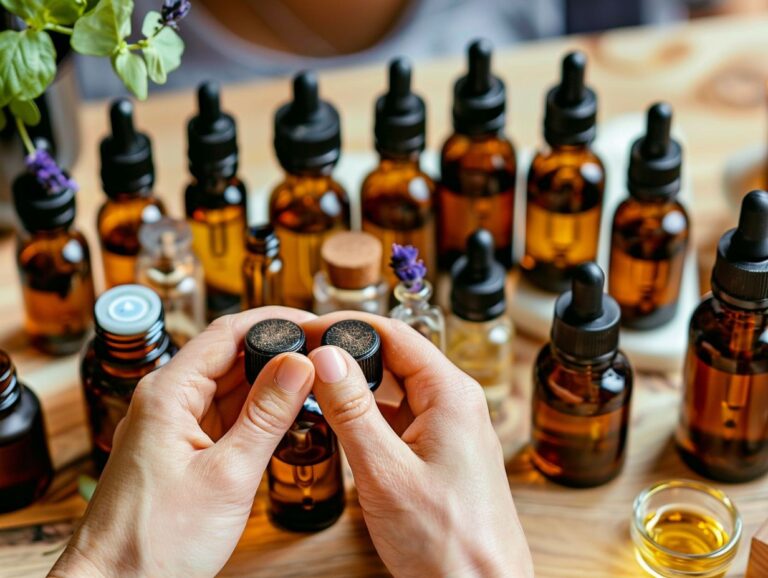Can Muslims Use Essential Oils
Essential oils have gained popularity for their various health and wellness benefits, but for Muslims, the question arises are essential oils halal?
We will explore the Islamic rulings on using essential oils, the different types and methods of using them, as well as the benefits they offer.
We will also discuss the potential risks and side effects of essential oils, and how Muslims can ensure the halal use of these aromatic oils.
Delve into the world of essential oils and find out more.
Key Takeaways:
What Are Essential Oils?
Essential oils are natural extracts derived from plants, known for their aromatic properties and various therapeutic benefits. These oils are commonly used in aromatherapy to promote physical and emotional well-being.
The history of essential oils dates back centuries, with their origins rooted in ancient civilizations like Egypt and Greece. The process of extracting these oils involves methods like distillation, where water or steam is used to separate the plant’s volatile compounds. Lavender and neroli are popular essential oils known for their calming and uplifting effects on the senses. In Islamic history, renowned figures like Ibn Sina, also known as Avicenna, extensively documented the use of essential oils for medicinal purposes, contributing significantly to the field of aromatherapy.
Are Essential Oils Halal for Muslims?
The use of essential oils among Muslims is a topic that intertwines Islamic history, the teachings of the Prophet, and various Hadith. Understanding their halal status requires exploration into these religious dimensions.
Essential oils hold a deep cultural significance in Islamic history, with roots tracing back to the practices of the Prophet Muhammad (peace be upon him) and the early Muslim community. The use of musk, frankincense, and bukhoor in perfumes and incense has been a cherished tradition for centuries.
These aromatic treasures not only carry pleasant scents but also symbolize purity, spirituality, and connection to the divine. Scholars like Ibn Sina, also known as Avicenna in the Western world, further emphasized the therapeutic benefits of essential oils, highlighting their healing properties in traditional medicine.
What Are the Islamic Rulings on Using Essential Oils?
Islamic rulings on using essential oils stem from the guidance of the Prophet and interpretations of relevant Hadith. Understanding these teachings is crucial for Muslims seeking to incorporate aromatherapy into their daily lives.
Roses and their fragrance hold a special place in Islamic traditions, symbolizing beauty and grace. In Oman, the use of essential oils for healing purposes has deep roots, reflecting a long history of natural remedies. The Arabic language itself has various references to fragrant oils, highlighting their significance in cultural and religious practices.
What Are the Different Types of Essential Oils?
The world of essential oils is vast and diverse, offering a wide array of options with unique scents and healing properties.
Each essential oil is derived from various plants, flowers, or fruits, capturing the essence of nature’s botanical wonders. For instance, lavender oil, extracted from the fragrant violet flowers, is renowned for its calming and relaxing aroma, ideal for stress relief and promoting better sleep. On the other hand, hibiscus oil, sourced from the vibrant hibiscus plant, is known for its skin-nourishing properties, helping with hydration and improving skin elasticity.
How Are Essential Oils Used?
Essential oils find application in various ways, from aromatherapy practices to skincare routines and holistic wellness treatments. Understanding the different methods of using essential oils enhances their efficacy and benefits.
One common method of using essential oils is through diffusion, where they are added to devices like diffusers that disperse the aroma throughout a room, creating a calming or invigorating atmosphere.
Topical application involves diluting essential oils with carrier oils before applying them directly to the skin, allowing for absorption and potential benefits such as improved skin health or relaxation.
Inhalation, another popular method, includes techniques like steam inhalation or adding drops to a bowl of hot water for respiratory or emotional support.
What Are the Different Methods of Using Essential Oils?

The versatility of essential oils allows for multiple methods of application, such as inhalation, topical use, and even ingestion in some cases. Each method offers unique benefits and considerations for effective use.
- Steam inhalation: One popular method is steam inhalation, where a few drops of Lavender oil are added to a bowl of hot water, allowing the steam to carry the aroma for respiratory benefits.
- Massage: By diluting essential oils in a carrier oil, such as Al-Razi did in his influential works, one can enjoy the therapeutic effects of the oils through skin absorption.
- Bath soaks: Adding a few drops of Rose oil to a warm bath not only creates a fragrant experience but also promotes relaxation and skin nourishment. This practice has roots in ancient cultures, like mentioned on IslamicBoard, where essential oils were revered.
What Are the Benefits of Using Essential Oils?
The benefits of using essential oils extend beyond pleasant aromas, encompassing therapeutic effects that promote relaxation, digestion, skin health, and immune system support. Embracing these benefits enhances overall well-being.
When incorporating essential oils into your daily routine, you tap into a rich history dating back to ancient civilizations like Ibn Khaldun who recognized the healing power of these potent extracts. The art of distilling musk and roses to extract essential oils has been perfected over centuries in many cultures, including Islamic science. These oils not only benefit the physical body but also have a profound impact on mental clarity, emotional well-being, and spiritual connection.
Promotes Relaxation and Reduces Stress
Essential oils are renowned for their calming properties that aid in relaxation and stress reduction.
In Islamic science, certain oils like bukhoor have been traditionally used for their therapeutic effects on the mind and body. The Prophet Muhammad (peace be upon him) is said to have favored fragrances such as roses, known for their calming scent and stress-relieving qualities.
The Arabic language itself acknowledges the power of scents, with many words dedicated to describing various fragrances and their impact on emotions. Research studies have also demonstrated the effectiveness of essential oils like lavender, chamomile, and frankincense in reducing anxiety levels and promoting relaxation.
Aids in Digestion and Relieves Nausea
Certain essential oils possess digestive benefits that can alleviate discomfort and nausea. By leveraging these oils, individuals can support their digestive systems and experience relief from common gastrointestinal issues.
One such potent essential oil known for its digestive properties is frankincense, historically revered for its healing abilities and mentioned in ancient texts like the Hadith. In Islamic history, frankincense, often sourced from regions like Oman, played a significant role in both medicinal and ceremonial practices. The renowned polymath Ibn Sina, or Avicenna, a prominent figure in Islamic medicine, also highlighted the digestive benefits of this aromatic oil.
Improves Skin Health
Essential oils offer a natural approach to skincare, with specific oils targeting various skin concerns such as acne, aging, and dryness. Integrating these oils into skincare routines can enhance skin health and radiance.
One of the most beloved essential oils for skincare is roses oil, known for its soothing properties and ability to hydrate the skin deeply. Extracted through distilling the petals of fresh roses, this luxurious oil is rich in antioxidants, making it ideal for combating signs of aging.
Lavender, another popular essential oil, has soothing and anti-inflammatory properties, making it perfect for calming irritated skin or reducing redness. Ibn Khaldun, the famous Islamic scholar, even wrote about the benefits of lavender in skincare in his works.
Boosts Immune System
Certain essential oils exhibit immune-boosting properties that can help protect the body from pathogens and enhance overall immunity. Integrating these oils into wellness practices can fortify the immune system naturally.
One of the widely recognized essential oils for immune support is lavender, known for its calming aroma and antibacterial properties.
In terms of creating these potent oils, the process of distilling plays a crucial role in extracting their therapeutic benefits.
In Islamic science, the use of aromatic plants like roses for medicinal purposes dates back centuries, with scholars like Ibn Khaldun documenting their significance in preserving health.”
Are There Any Risks or Side Effects of Using Essential Oils?

One of the common adverse effects of essential oils is the possibility of triggering allergic reactions in individuals sensitive to certain compounds. This can manifest as skin rashes, itching, or even respiratory issues. Some essential oils, like those with high concentrations of certain constituents such as menthol or eugenol, can cause skin irritation when used directly without proper dilution.
Another critical aspect to consider is the potential for essential oils to interact with medications, potentially altering their effectiveness or causing unforeseen side effects. It’s recommended to consult with a healthcare professional, especially if you are on specific medications or have underlying health conditions. For example, certain oils may interfere with blood thinners or antidepressants.
Allergic Reactions
Allergic reactions to essential oils can manifest as skin redness, itching, or respiratory issues in sensitive individuals. Prior patch testing and dilution are essential precautions to mitigate the risk of adverse reactions.
Frankincense, a popular essential oil with roots in Islamic history and mentioned in Hadith, can trigger allergic responses if not used carefully. Sensitivity to fragrances varies among individuals, necessitating caution, especially if one has existing skin conditions.
In the historical context, Ibn Sina from Oman, known for his contributions to medicine, emphasized the importance of understanding allergic reactions in healing. It is crucial to consult a healthcare professional if experiencing severe allergic symptoms to essential oils.
Skin Irritation
Skin irritation from essential oils can range from mild redness to more severe reactions like dermatitis. Diluting oils and avoiding prolonged skin contact can help minimize the risk of skin irritation.
When using bukhoor, it’s essential to be cautious due to the strong concentration of aromatic compounds present. These compounds, which are derived from various sources such as roses and other natural elements, can sometimes trigger skin irritation.
In Islamic science, the importance of essential oils has been recognized for centuries, with references to their benefits as mentioned by the Prophet. To prevent adverse skin reactions, always perform a patch test before applying any oil directly to your skin. This simple step can help you identify any potential sensitivities and adjust your usage accordingly.
Considering that Arabic language has a rich history in aromatherapy and natural remedies, exploring traditional methods of dilution and application can be beneficial in managing skin irritation effectively.”
Interactions with Medications
Essential oils can interact with medications, affecting their efficacy or causing unexpected side effects. Consultation with healthcare providers and proper research on oil-drug interactions is crucial for safe use.
It is essential to be aware of potential interactions that may occur when using essential oils alongside medications. For example, lavender oil, known for its calming properties, could potentially enhance the effects of certain sedative medications, leading to excessive drowsiness.
In terms of the extraction process, distilling oils like rose or frankincense requires precision and expertise. This ensures the purity and quality of the essential oil, making it safe for use.
For further guidance on using essential oils, individuals can seek advice from reputable online platforms like IslamicBoard or consult with experts like Ibn Khaldun, who have extensive knowledge in holistic remedies.
How Can Muslims Ensure the Halal Use of Essential Oils?
For Muslims, ensuring the halal use of essential oils involves considering their sources, production methods, and adherence to Islamic guidelines. Consulting with knowledgeable Islamic scholars can provide clarity on using oils in accordance with religious principles.
One common practice among Muslims is to choose oils derived from natural sources, such as musk and frankincense, known for their purity. A key figure in the history of medicine, Avicenna, also known as Ibn Sina, emphasized the importance of ethical practices in perfumery.
In terms of bukhoor, a fragrant scented woodchip, Muslims often seek out trusted suppliers who offer products with transparent origins and production processes. Checking for certifications and labels that verify the halal status of essential oils can further assure consumers of their compliance with Islamic teachings.
Check the Ingredients
When seeking halal essential oils, it is essential to scrutinize the ingredients used in their production. Ensuring that all components align with Islamic principles and teachings is crucial for halal compliance.
According to Hadith, the Prophet Muhammad emphasized the importance of using pure and permissible substances in our daily lives. For instance, the use of fragrances from roses was highly encouraged, symbolizing purity and beauty.
In regions like Oman, known for its rich history of producing high-quality essential oils, the tradition of crafting scents has deep roots.
The significance of the Arabic language in labeling and verifying ingredients cannot be underestimated, as it ensures clear communication and full transparency for consumers seeking halal products.
Use Certified Halal Essential Oils

In terms of essential oils, the quality and purity can greatly impact their effectiveness. By choosing certified halal essential oils sourced from reputable suppliers, individuals can be confident that they are adhering to Islamic standards in their daily routines. Whether it’s the soothing scent of lavender or the invigorating properties of hibiscus, knowing that these oils have been certified halal adds an extra layer of assurance.
The process of certification involves a rigorous evaluation of the entire production chain, from sourcing to manufacturing, ensuring that all aspects align with the principles of Islamic science. Entities like roses and countries like Oman are known for their rich history in producing high-quality essential oils, making them trusted sources for those seeking halal options.
Consult with a Trusted Islamic Scholar
Seeking guidance from knowledgeable Islamic scholars can provide clarity on the permissibility of using essential oils in accordance with religious teachings. Their expertise can help navigate the nuances of halal practices in aromatherapy.
In terms of the world of essential oils, it’s essential to delve into how they are produced. Lavender oil, for instance, is commonly extracted through steam distillation, while neroli oil is often obtained through the delicate process of steam distilling the blossoms of the bitter orange tree.
Islamic scholars, drawing knowledge from esteemed figures such as Ibn Khaldun, can offer insights into the distillation methods used for essential oils and the permissibility of their application. Communities like IslamicBoard can also serve as valuable platforms for discussions and guidance on using these aromatic substances in alignment with Islamic principles.
It is always wise to seek counsel from these sources to ensure that the use of essential oils aligns with the halal practices advocated within the Islamic faith.
Frequently Asked Questions
Can Muslims Use Essential Oils?
Yes, Muslims can use essential oils as they are derived from natural plant sources and do not contain any prohibited substances in Islam.
Are Essential Oils Considered Halal for Muslims?
Yes, essential oils are considered halal for Muslims as they are made from natural ingredients and do not contain any alcohol or animal-derived substances.
What Benefits Do Essential Oils Have for Muslims?
Essential oils have numerous benefits for Muslims, including physical, mental, and spiritual well-being. They can help with relaxation, relieve anxiety and stress, and can even have medicinal properties.
Are There Any Specific Essential Oils Recommended for Muslims?
There are no specific essential oils recommended for Muslims, but some popular ones include frankincense, lavender, and peppermint, which have been used for centuries in Islamic traditions for their healing properties.
Is It Permissible to Use Essential Oils for Aromatherapy in Islam?
Yes, it is permissible to use essential oils for aromatherapy in Islam. Prophet Muhammad (peace be upon him) used to use natural scents for fragrance and healing purposes, and essential oils are considered a natural and permissible option for aromatherapy.
Can Muslims Use Essential Oils for Medicinal Purposes?
Yes, Muslims can use essential oils for medicinal purposes as long as they do not contain any prohibited substances and are used in accordance with Islamic principles of seeking medical treatment. It is always recommended to consult with a healthcare professional before using essential oils for medicinal purposes.







